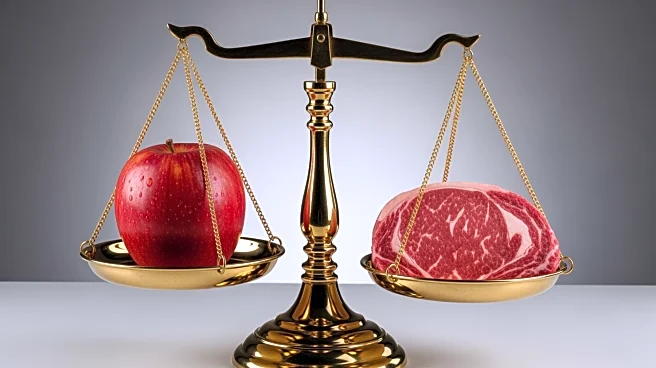What's Happening?
President Trump has accused foreign-owned meat packers of inflating beef prices in the United States and has directed the Department of Justice to investigate potential illicit collusion, price fixing,
and price manipulation. This move comes after Republican senators, including Markwayne Mullin, Cindy Hyde-Smith, and Tim Sheehy, discussed the issue with Trump at the White House. The beef market has seen volatility, with prices reaching record levels due to factors such as drought and tariffs on Brazilian beef imports. JBS, a Brazilian company, is the largest U.S. beef producer and has previously faced price-fixing charges, settling a lawsuit in 2022 without admitting wrongdoing.
Why It's Important?
The investigation into meat packers is significant as it addresses concerns about market concentration and its impact on consumer prices. The beef industry is dominated by a few major companies, raising antitrust issues that affect farmers and consumers alike. The outcome of this investigation could lead to changes in industry practices and regulations, potentially benefiting American ranchers and consumers by ensuring fair pricing and competition. Additionally, this move by President Trump highlights ongoing political efforts to address rising food costs, a key issue for voters.
What's Next?
The Department of Justice's investigation may lead to legal actions against the meat packers if evidence of collusion or price manipulation is found. This could result in fines, settlements, or changes in industry regulations. Political leaders and industry stakeholders will likely monitor the investigation closely, as its findings could influence future policy decisions and impact the beef market. The investigation may also prompt discussions on broader food industry practices and competition.
Beyond the Headlines
The investigation into meat packers could have broader implications for food security and industry transparency. Ethical concerns about corporate practices and their impact on food prices may lead to increased scrutiny and calls for reform. The case also highlights the challenges of balancing international trade and domestic market stability, as tariffs and foreign ownership play a role in shaping the U.S. beef industry.









